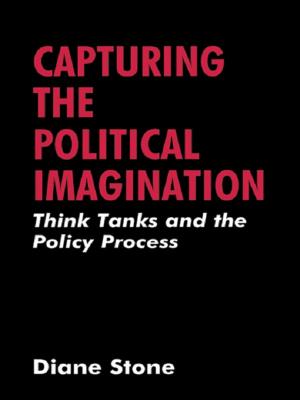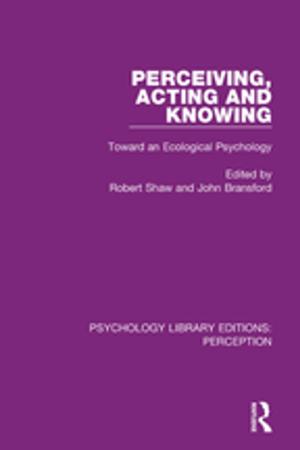How Educational Ideologies Are Shaping Global Society
Intergovernmental Organizations, NGOs, and the Decline of the Nation-State
Nonfiction, Reference & Language, Education & Teaching, Educational Theory, Aims & Objectives, Philosophy & Social Aspects| Author: | Joel Spring | ISBN: | 9781135614126 |
| Publisher: | Taylor and Francis | Publication: | April 8, 2014 |
| Imprint: | Routledge | Language: | English |
| Author: | Joel Spring |
| ISBN: | 9781135614126 |
| Publisher: | Taylor and Francis |
| Publication: | April 8, 2014 |
| Imprint: | Routledge |
| Language: | English |
In this book Joel Spring explores three major international educational ideologies that are shaping global society: neo-liberal educational ideology, human rights education, and environmentalism.
Neo-liberal ideology reflects a rethinking of nationalist forms of education as the nation-state slowly erodes under the power of a growing global civil society. Traditional nationalist education attempts to mold loyal and patriotic citizens who are emotionally attached to symbols of the state, whereas the goal of neo-liberal educational ideology is to change nationalist education to serve the needs of the global economy. These changes are fueling a clash between the ideas of free-market and consumer-based neo-liberals and those of human rights and environmental educators.
Human rights education is concerned with creating activist global citizens. It is rooted in the idea that inherent in human rights doctrines is a collective responsibility to ensure the rights of all people.
Environmentalism is the most radical of the ideologies because it rejects the industrial and consumerist paradigm that has dominated most economic thought, including capitalism and communism.
Spring synthesizes and analyzes the effect of these educational ideologies on shaping the future of the global society. In the concluding section, he compares the effect of these ideologies on global society with the possibility of a world divided between conflicting civilizations. How Educational Ideologies Are Shaping Global Society: Intergovernmental Organizations, NGOs, and the Decline of the Nation-State features:
*a critical exploration of the transition of schooling from a function of the nation-state to a globalized economic and political system;
*a discussion of the major organizations and trading blocs shaping the future globalization of educational policies;
*an analysis of the major competing global ideologies of education--including national and corporate models that emphasize training workers for a competitive global free market; the worldwide network of human rights and peace educators who are teaching a global set of ethics; and the environmental movement's efforts to create a common set of educational standards for sustainable development and sustainable consumption; and
*an exploration of the possible future of global educational policy and school organizations.
By integrating a wide range of previously scattered information within a bold new framework for understanding educational ideologies and their impact on the global society, Spring raises important questions for researchers, professionals, and students in history and philosophy of education, educational policy, educational studies, comparative education, multicultural education, curriculum studies, critical media studies, global studies, human rights education, and related areas.
In this book Joel Spring explores three major international educational ideologies that are shaping global society: neo-liberal educational ideology, human rights education, and environmentalism.
Neo-liberal ideology reflects a rethinking of nationalist forms of education as the nation-state slowly erodes under the power of a growing global civil society. Traditional nationalist education attempts to mold loyal and patriotic citizens who are emotionally attached to symbols of the state, whereas the goal of neo-liberal educational ideology is to change nationalist education to serve the needs of the global economy. These changes are fueling a clash between the ideas of free-market and consumer-based neo-liberals and those of human rights and environmental educators.
Human rights education is concerned with creating activist global citizens. It is rooted in the idea that inherent in human rights doctrines is a collective responsibility to ensure the rights of all people.
Environmentalism is the most radical of the ideologies because it rejects the industrial and consumerist paradigm that has dominated most economic thought, including capitalism and communism.
Spring synthesizes and analyzes the effect of these educational ideologies on shaping the future of the global society. In the concluding section, he compares the effect of these ideologies on global society with the possibility of a world divided between conflicting civilizations. How Educational Ideologies Are Shaping Global Society: Intergovernmental Organizations, NGOs, and the Decline of the Nation-State features:
*a critical exploration of the transition of schooling from a function of the nation-state to a globalized economic and political system;
*a discussion of the major organizations and trading blocs shaping the future globalization of educational policies;
*an analysis of the major competing global ideologies of education--including national and corporate models that emphasize training workers for a competitive global free market; the worldwide network of human rights and peace educators who are teaching a global set of ethics; and the environmental movement's efforts to create a common set of educational standards for sustainable development and sustainable consumption; and
*an exploration of the possible future of global educational policy and school organizations.
By integrating a wide range of previously scattered information within a bold new framework for understanding educational ideologies and their impact on the global society, Spring raises important questions for researchers, professionals, and students in history and philosophy of education, educational policy, educational studies, comparative education, multicultural education, curriculum studies, critical media studies, global studies, human rights education, and related areas.















